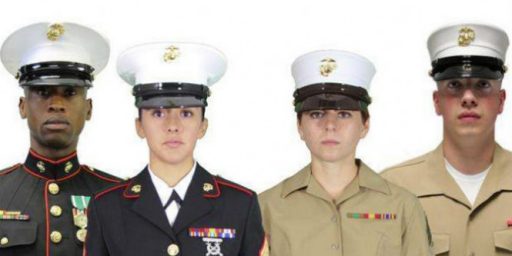The Real Story Of Fallujah
[WSJ-$] — The Real Story Of Fallujah
Robert Kaplan recounts the bravery and restraint of the men of Bravo Company of the 1st Battalion of the 5th Marine Regiment in their operations in Fallujah. He notes the irony that, just as the 1st of the 5th’s heroic actions in Hue City were overshadowed by the My Lai massacre in 1968, their conduct in Fallujah has been wiped out by the Abu Ghraib scandal.
But none of the above matters if it is not competently explained to the American public — for the home front is more critical in a counterinsurgency than in any other kind of war. Yet the meticulous planning process undertaken by the Marines at the tactical level for assaulting Fallujah was not augmented with a similarly meticulous process by the Bush administration at the strategic level for counteracting the easily foreseen media fallout from fighting in civilian areas near Muslim religious sites. The public was never made to feel just how much of a military threat the mosques in Fallujah represented, just how far Marines went to avoid damage to them and to civilians, and just how much those same Marine battalions accomplished after departing Fallujah.
We live in a world of burning visual images: As Marines assaulted Fallujah, the administration should have been holding dramatic slide shows for the public, of the kind that battalion and company commanders were giving their troops, explaining how this or that particular mosque was being militarily utilized, and how much was being done to avoid destroying them, at great risk to Marine lives. Complaining about the slanted coverage of Al-Jazeera — as administration officials did — was as pathetic as Jimmy Carter complaining that Soviet Communist Party boss Leonid Brezhnev had lied to him. Given its long-standing track record, how else could Al-Jazeera have been expected to report the story? You had the feeling that the Pentagon was reacting; not anticipating.
And had the administration adequately explained to the public about what the Marines were doing after Fallujah, there might have been less disappointment and mystification about quitting the fight there. But instead of a gripping storyline to compete with that of the global media’s, spokesmen for the White House, Pentagon, Coalition Provisional Authority (CPA) and the Baghdad-based military coalition, in their regular briefings about events in Iraq, continue to feed the public insipid summaries, with little visual context, that have all the pungency of watery gruel.
***
Because the battles in a counterinsurgency are small scale and often clandestine, the story line is rarely obvious. It becomes a matter of perceptions, and victory is awarded to those who weave the most compelling narrative. Truly, in the world of postmodern, 21st century conflict, civilian and military public-affairs officers must become war fighters by another name. They must control and anticipate a whole new storm system represented by a global media, which too often exposes embarrassing facts out of historical or philosophical context.
***
The American public can accept 50 casualties per week if the path to some sort of success is convincingly laid out. If it isn’t, the public won’t accept even two casualties per week. It could not be helped that the shame of My Lai, as awful as it was, should have been allowed to blot out American heroism at places like Hue: The phenomenon of the media as we know it was new back then. But if the stain of Abu Ghraib, for example, is not placed in its rightful perspective against everything else that soldiers and Marines are doing in Iraq, Afghanistan, the Philippines, Colombia and many other places in the War on Terrorism, then it won’t be the media’s fault alone.
Quite right. Indeed, this is a far more serious issue than either the “poor planning for the aftermath” or “not enough troops” memes. Both of the latter are debatable, at least. But the poor job of managing the communications game is simply baffling.



